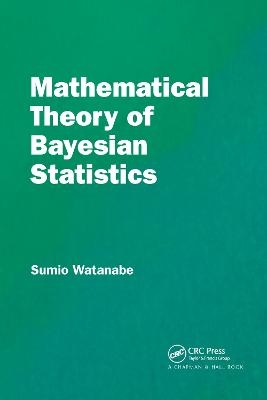
Mathematical Theory of Bayesian Statistics
Seiten
2020
Chapman & Hall/CRC (Verlag)
978-0-367-73481-7 (ISBN)
Chapman & Hall/CRC (Verlag)
978-0-367-73481-7 (ISBN)
This book introduces the mathematical foundation of Bayesian statistics. It is well known that Bayesian inference is more accurate than the maximum likelihood method in many real-world problems: however, its mathematical foundations have been left unexplained. Recently, new research on Bayesian statistics uncovered the mathematical laws by which
Mathematical Theory of Bayesian Statistics introduces the mathematical foundation of Bayesian inference which is well-known to be more accurate in many real-world problems than the maximum likelihood method. Recent research has uncovered several mathematical laws in Bayesian statistics, by which both the generalization loss and the marginal likelihood are estimated even if the posterior distribution cannot be approximated by any normal distribution.
Features
Explains Bayesian inference not subjectively but objectively.
Provides a mathematical framework for conventional Bayesian theorems.
Introduces and proves new theorems.
Cross validation and information criteria of Bayesian statistics are studied from the mathematical point of view.
Illustrates applications to several statistical problems, for example, model selection, hyperparameter optimization, and hypothesis tests.
This book provides basic introductions for students, researchers, and users of Bayesian statistics, as well as applied mathematicians.
Author
Sumio Watanabe is a professor of Department of Mathematical and Computing Science at Tokyo Institute of Technology. He studies the relationship between algebraic geometry and mathematical statistics.
Mathematical Theory of Bayesian Statistics introduces the mathematical foundation of Bayesian inference which is well-known to be more accurate in many real-world problems than the maximum likelihood method. Recent research has uncovered several mathematical laws in Bayesian statistics, by which both the generalization loss and the marginal likelihood are estimated even if the posterior distribution cannot be approximated by any normal distribution.
Features
Explains Bayesian inference not subjectively but objectively.
Provides a mathematical framework for conventional Bayesian theorems.
Introduces and proves new theorems.
Cross validation and information criteria of Bayesian statistics are studied from the mathematical point of view.
Illustrates applications to several statistical problems, for example, model selection, hyperparameter optimization, and hypothesis tests.
This book provides basic introductions for students, researchers, and users of Bayesian statistics, as well as applied mathematicians.
Author
Sumio Watanabe is a professor of Department of Mathematical and Computing Science at Tokyo Institute of Technology. He studies the relationship between algebraic geometry and mathematical statistics.
Sumio Watanabe is a professor in the Department of Computational Intelligence and Systems Science at Tokyo Institute of Technology, Japan.
Mathematical Theory of Bayesian Statistics
| Erscheinungsdatum | 16.01.2021 |
|---|---|
| Sprache | englisch |
| Maße | 156 x 234 mm |
| Gewicht | 280 g |
| Themenwelt | Geisteswissenschaften ► Psychologie ► Allgemeine Psychologie |
| Mathematik / Informatik ► Mathematik ► Statistik | |
| Naturwissenschaften ► Biologie | |
| ISBN-10 | 0-367-73481-8 / 0367734818 |
| ISBN-13 | 978-0-367-73481-7 / 9780367734817 |
| Zustand | Neuware |
| Informationen gemäß Produktsicherheitsverordnung (GPSR) | |
| Haben Sie eine Frage zum Produkt? |
Mehr entdecken
aus dem Bereich
aus dem Bereich
Techniken der Verhaltenstherapie
Buch (2024)
Julius Beltz GmbH & Co. KG (Verlag)
35,00 €


